- Home
- Louis Sachar
Dogs Don't Tell Jokes Page 9
Dogs Don't Tell Jokes Read online
Page 9
“I’m in it,” Gary said. “I’m not going to quit.”
“Well, you’ll have to talk to Brenda Thompson. It may be too late.”
He found Brenda as she was coming up the stairs along with Julie Rose.
It took Brenda a while to figure out what Gary was talking about because she didn’t know he’d ever quit the show.
“So then I’m in?” asked Gary.
“Yes. You were never out,” said Brenda.
Julie Rose stared oddly at him. He wondered what Matt or Paul told her about why he had come to her house the other day. Well, he couldn’t worry about it. He was back in the talent show—that was the most important thing.
“You gonna stick around for some football?” asked Joe.
Gary sighed. “I can’t.”
“What’s with you anyway, Goon?” Zack asked.
“I have to work on my act for the talent show. It’s tomorrow night.”
Joe and Zack looked uneasily at each other.
“C’mon, Goon, we really need you,” said Joe.
“I thought you were going to do a rap,” Gary said.
“I am,” said Joe. “I made it up last week. It took about twenty minutes. No big deal. It’s just a stupid talent show.”
“Yeah, I know,” said Gary.
“So what do you say?” asked Joe.
“No, I really need to go home,” Gary said. “I guess things don’t come as easy for me as they do for you.”
“Personally, Goon, I think you need a change in attitude,” said Joe. “Lighten up. It’s supposed to be fun. Who knows? Anything can happen. Do you hear what I’m saying? Anything can happen.”
“I know that,” said Gary.
“So how about it?” asked Zack. “Are you going to play football or not?”
“I can’t.”
“Suit yourself,” said Joe. “But don’t say we didn’t warn you.”
He tried not to think about it. He remembered what Angeline had said: “Don’t think about Friday. Think about Saturday.
“No matter what happens, by Saturday it will all be over—forever.”
21.
“How could I think that was funny?” Gary asked as he went over his routine. He shook his head in disbelief.
The jokes he used to think were great now didn’t seem funny at all. Especially the ones he had made up yesterday.
He decided two of the new jokes were kind of funny. He threw away the other three.
“A bad joke is like a rotten fish,” he decided. “You don’t know it’s bad until the next day when it starts to stink.”
He laughed. “That’s good! That’s funny! I don’t think I can use it for my routine, but it’s still funny!”
Suddenly, out of nowhere, he remembered one of the other jokes that he had decided not to use. It was funny. “Why didn’t I think it was funny yesterday?” He wondered what made him suddenly remember it. For that matter, he wondered how he ever thought up any of his jokes in the first place.
BANG! Gary flung himself on his bed, as if a bomb had just exploded in his room—or in his head. He rolled over, looked up at the ceiling, and whispered “Perfect.”
He had come up with the big finish for his act.
There was just one question: Would he really have the guts to do it?
“Sure. Why not?”
It meant he’d have to reorganize his whole routine to make the ending work just right. He’d have to change the beginning and the middle to fit the ending, and have the whole thing memorized by tomorrow night.
He hoped the thrift store still had the hat. If not, he could always use one of his other hats, but the one at the thrift store was better because it was a little too tight.
He’d need help, too. His parents wouldn’t help him, that was for sure. He didn’t dare tell his parents.
Before he changed his mind, he went to the kitchen and called Gus on the telephone.
Then he called the thrift store and told the woman to save the hat for him. He’d pick it up tomorrow on the way home from school.
Gary went through his routine, from beginning to end, for the third time. It was still too choppy. It needed to be smoother. The timing was all wrong.
He set his notes aside and tried doing it from memory. He was surprised by how much he had memorized. He only had to look at his notes a couple of times.
Then he went through it again, and this time he didn’t have to look at his notes at all. He sighed in disgust. “It sounds like I’m reciting the Gettysburg Address or something.”
He didn’t want it to sound like he was reciting something he had memorized. It had to sound natural, like he was making it up as he went along.
“Okay, one more time.”
Timing was the most important thing. He didn’t want to pause too long, or too short. The pause had to be perfect. The pause was all-important.
Or was it? Should he pause at all? When? How long? Why?
“AAAAAAHHHHHH!” he shouted.
He stared at his blank walls. He didn’t know. He just didn’t know. He had gone over the jokes so many times he didn’t even know what was a joke and what wasn’t.
There was a knock on his door.
“What!” he shouted.
His mother peeked around the door. “I know you said you didn’t want to be disturbed for anything …”
He glared at her. Actually, he was grateful for the interruption, but he didn’t let on.
“Angeline’s on the phone,” his mother said. “She said it was urgent. Do you want me to tell her you’ll call her back?”
“No, I’ll talk to her,” said Gary.
Gary’s mother seemed a little insulted that while she, his own mother, wasn’t allowed to interrupt him, he was perfectly willing to leave his room to talk to Angeline.
He took the call in the kitchen. Maybe Angeline’d get to come to the talent show after all.
“Hi. What’s up?”
Angeline came straight to the point. “Don’t do your act in the show tomorrow.”
“What?”
“Something terrible is going to happen,” she said. “A disaster.”
“Aw, c’mon,” said Gary. “I know my jokes may not be funny, but no one’s ever called them a disaster. Ha. Ha.”
Angeline didn’t laugh. “I’m serious, Gary. I started feeling it right after dinner, and then I started crying and couldn’t stop. I can still feel it.”
Gary could hear her fighting back tears now.
“Please don’t do it,” she begged. “Just quit the talent show.”
“Why? What’s going to happen?”
“I don’t know, I don’t know,” said Angeline. “I’ve never felt something like this before.”
“Are you sure it’s bad?” he asked. “If you’ve never felt anything like it before, then how do you know it will be a disaster?”
“I know,” said Angeline. “If you break your leg, you don’t need a doctor to tell you you can’t walk.”
Gary took a breath. “It’s all memorized,” he said.
They stayed on the line for another minute or so without speaking. Then each said goodbye.
Gary gently hung up the phone. He took a breath and turned to see Mrs. Snitzberry, in her green pajamas, sitting cross-legged on the counter, between the sink and the stove.
“Who was that?” Mrs. Snitzberry asked Gary.
“Angeline,” said Gary.
“What’d she want?”
Gary thought a moment. “Nothing,” he muttered.
“Who are you talking to?” asked Gary’s father.
Startled, Gary turned. He hadn’t noticed his father reading the paper at the kitchen counter. He looked back at Mrs. Snitzberry, who slowly faded away before his eyes.
“Nobody,” he said.
There was still time to quit. There was always time to quit. Right up to the last minute. He didn’t have to tell anyone he was quitting. Just not show up.
“Well, if it’s a disaster, th
en it’s a disaster,” said Gary as he walked across the schoolyard. “Like Miss Longlegs said, I can’t keep signing up and quitting, and signing up and quitting. Besides, I already called Gus.
“If it’s a disaster, then it’s a disaster,” he said again. “There’s nothing I can do about it. Besides, how bad can it be?”
22.
It was time.
“Do you need to use the bathroom before you go?” asked his mother.
“No, I don’t have to use the bathroom!” he snapped. He was twelve years old, and his mother still asked him that.
She smiled at him. “You look very handsome,” she said. She sounded surprised.
He had chosen his outfit carefully. White shoes, white pants, navy-blue shirt, red suspenders, and the navy-blue homburg that he’d bought at the thrift store after school.
“The talent show isn’t until seven o’clock,” said his father. “Don’t you want any dinner?”
“All the contestants have to get there early,” Gary explained. “We need to go over our entrances, exits, how we want to be introduced, stuff like that.”
If he ate any dinner, he’d probably throw up.
“Well … see you there,” his mother said. Then she kissed him.
“Good luck,” said his father.
“Oh, Dad, I wanted to ask you something,” said Gary. “If there were three birds sitting on a bench, and I shot one, how many would be left?”
“Two.”
“Nope, just one,” said Gary, “The dead one. The other two would fly away!” He laughed. “Oh well, I guess I don’t get the hundred dollars now.” He was still laughing as he walked out the door.
He carried a grocery bag full of the props he’d need for his act. It was rolled up at the top so no one could see inside.
He had lied about having to get to school early. He went to Gus’s house.
“Wow, you look great!” Gus said when he opened the door.
Gary shrugged. He wished people would stop saying it like that. It made him wonder if most of the time he looked like a slob or something.
Gus’s house reminded Gary of a museum, or more precisely, a storage room in a museum. He looked around with awe at all the objets d’art that Gus had collected over his sixteen years as a garbageman: strange and bizarre lamps, vases, wall hangings, a painting of a dead fish, several road signs, a pirate’s head, a stuffed armadillo, a candle shaped like a lizard …
“Have I ever showed you my law school diploma?” asked Gus.
“You went to law school?”
“No, Kevin David Lally went to law school.”
Hanging next to a velvet painting of a sexy lady and her poodle was the dignified law school diploma of someone named Kevin David Lally.
“I wonder why someone would throw away a law school diploma,” said Gary.
Gus shrugged. “Why would anyone throw away such a great picture?”
Gary looked back at the painting of the lady and the poodle. He wished the poodle would move just a little bit to the left.
“So, you really want to do this?” asked Gus.
Gary nodded. “You haven’t told anybody?” he asked.
“Are you kidding? And you better not either.”
“I won’t,” Gary promised. “Don’t you even want to know why?”
“I figure I’ll find out along with everyone else,” said Gus.
Gary took a deep breath.
“You’re sure?” asked Gus.
“One hundred percent,” said Gary.
Fifty-five minutes later, he was standing outside the door to the school auditorium holding his grocery bag full of props.
“So, are you just going to stand there, or are you going to go inside?” asked Mrs. Snitzberry.
He glanced at her. “Disaster is my middle name,” he said, then opened the door.
“Pigbubble is my middle name,” said Mrs. Snitzberry.
Gary walked down the aisle between the rows of folding chairs, empty now. Miss Langley was up on stage, along with the custodian. Miss Langley appeared to be testing the microphone, but apparently it wasn’t working, because he couldn’t hear her.
He could see two other kids also on stage. Susan Smith was doing some warm-up exercises. Marsha Posey was holding a pair of roller skates. An old piano was off to the left.
Gary walked up the stairs on the side of the stage. There were several kids sitting on benches behind the purple plush curtain. Though the curtain was open, the benches still could not be seen from the auditorium.
Gary sat on a bench behind Julie Rose and Brenda Thompson. He set his paper bag under the bench. A red-haired boy whom Gary didn’t know was seated at the other end of the bench.
Gary watched Susan Smith in her black leotard raise one leg above her shoulder.
He stretched out his mouth, wiggled his jaw back and forth, and moved his tongue from side to side and in and out.
The boy with red hair looked at him, and Gary stopped his warm-up exercises. The boy was holding what appeared to be a program. Julie and Brenda also seemed to have programs.
“Where’d you get the program?” he asked the boy beside him.
The boy didn’t seem to hear him.
“At the back table,” said a girl who had sat down on the bench behind Gary. “You can have mine. I have an extra one.”
Gary turned around. The girl had short curly blond hair and wore braces. He recognized her from school, but he didn’t know her name.
She blushed. “I took two by accident. Here!” She shoved a program at him, then looked away, as if terribly embarrassed by the whole incident.
“I have to go first!” the red-haired boy complained. “I always have to go first. It’s because of my name, I know it!”
“Too bad,” said Gary, trying not to let on how glad he was that he wasn’t the one who had to go first.
He opened the program to the list of contestants.
1. Fred Furst
Fred will do several bird imitations. He is 11 years old and says he’s been interested in birds all his life.
2. Connie Lee
Connie will play the guitar and sing. She is 13 and has been playing the guitar for two and a half years.
3. Susan Smith
Susan, age 12, will perform gymnastics. She is hoping to be an Olympic gymnast someday.
4. Joe Reed
Joe, age 12, will sing a rap song of his own composition called “Goin’ Insane.”
5. Brenda Thompson
Brenda, age 12, will sing “Girls Just Want to Have Fun.” Brenda is secretary of the student council and the inspiration behind this event.
6. Matt Hughes
Matt, age 12, will tell some of his favorite jokes. His friends say he’s the funniest kid in school.
7. Leslie Ann Cummings
Leslie, age 11, will sing a medley of Cole Porter songs. She says her favorite songs are show tunes and she doesn’t much care for modern music.
8. Julie Rose
Julie, age 12, will recite several of her own poems. She is president of the student council. She says she wants to be a poet when she grows up, but adds that she wants to make money too.
9. Marsha N. Posey
Marsha, age 13, will perform several tricks on roller skates. “I just like to skate,” says Marsha.
10. Alex Roth
Alex will perform Bach’s Inventions Nos. 1 and 8 on the piano. He is 13 years old and has been taking piano lessons since age 5.
Gary turned the page, but there were no more contestants listed. He checked again to make sure he hadn’t missed his name. “Where am I?” he shouted.
“In the school auditorium,” said the red-haired boy, who apparently was Fred Furst, the bird imitator.
“I’m not listed in the program!”
“Are you sure you’re supposed to be in it?” asked the girl with braces.
“Yes!”
“You weren’t at rehearsal,” said Fred Furst.
“What rehearsa
l?”
“After lunch today,” said the girl. “It wasn’t really a rehearsal. We just went over what we would do, how we wanted to be introduced, entrances and exits, stuff like that.”
“I didn’t know about it,” said Gary. “Nobody told me. Brenda!”
Both Julie and Brenda turned around. “What’s your problem?” asked Julie.
“I’m not in the program,” he told Brenda. “Did you ever tell Miss Langley that I wanted to be back in the talent show?”
“What are you talking about?”
“Remember, I told you I wanted to be back in the show, and you didn’t even know I quit? Well, I had quit, and you were supposed to put me back on the list.”
Brenda made a face. “Don’t blame me for your problems.”
He jumped up. “Miss Langley!”
She was talking to the principal, Mrs. Ward, at the other side of the stage. He went over to them and waited for a pause in their conversation, but Mrs. Ward never paused, so he just broke in. “Miss Langley!”
Both of them looked at him.
“My name’s not in the program.”
Miss Langley seemed to be thinking about something else, but managed to focus her attention on him. “Your name’s not in the program because you told me you wanted to quit the show.”
“But then I said I wanted back in.”
“And I told you to talk to Brenda Thompson.”
“I did! But she didn’t realize I’d quit, so she didn’t do anything to put me back in.”
Miss Langley sighed. “Why weren’t you at the rehearsal this afternoon?”
“I didn’t know about it.”
Miss Langley shook her head. “Well, I can’t do anything about it now. The programs are all printed. I’m afraid it’s too late.”
“But—”
I’m sorry, Gary, I’ve got a million things to do.” She resumed her conversation with Mrs. Ward about the opening address Mrs. Ward would be giving.
Gary spotted Joe coming into the auditorium, along with Matt, Ryan, and Paul.
“Joe!” called Gary. He jumped off the stage. “Joe. You got to help me!”
Joe put his hands up. “Whoa,” he said. “Get a grip, Goon.” He looked Gary up and down. “Nice uni.”
“Huh?”
“He likes your clothes, Goon,” said Matt. “Your uniform.”

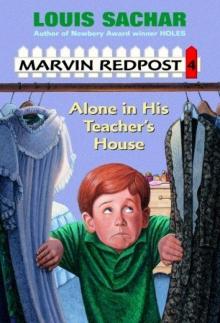 Alone in His Teacher's House
Alone in His Teacher's House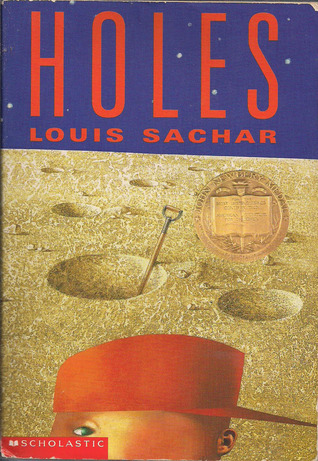 Holes
Holes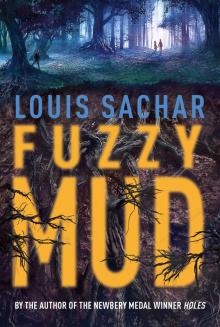 Fuzzy Mud
Fuzzy Mud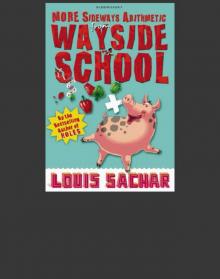 More Sideways Arithmetic From Wayside School
More Sideways Arithmetic From Wayside School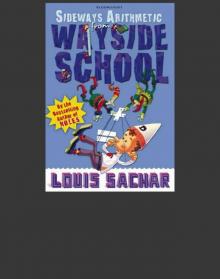 Sideways Arithmetic From Wayside School
Sideways Arithmetic From Wayside School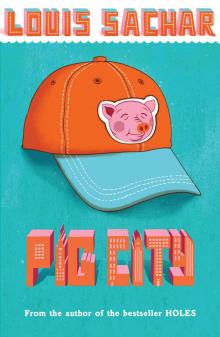 Pig City
Pig City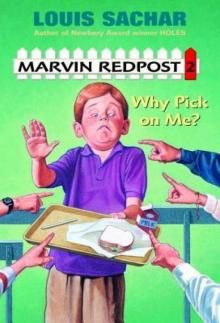 Why Pick on Me?
Why Pick on Me? The Boy Who Lost His Face
The Boy Who Lost His Face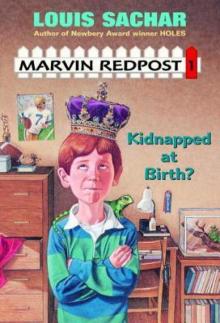 Kidnapped at Birth?
Kidnapped at Birth? There's a Boy in the Girls' Bathroom
There's a Boy in the Girls' Bathroom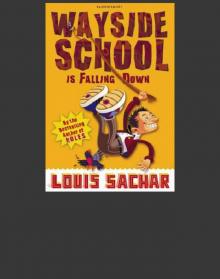 Wayside School Is Falling Down
Wayside School Is Falling Down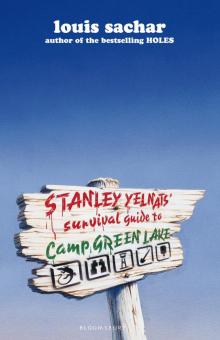 Stanley Yelnats' Survival Guide to Camp Green Lake
Stanley Yelnats' Survival Guide to Camp Green Lake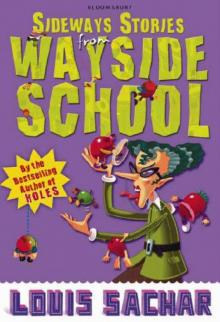 Sideways Stories from Wayside School
Sideways Stories from Wayside School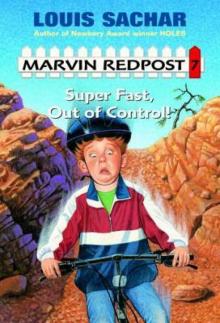 Super Fast, Out of Control!
Super Fast, Out of Control!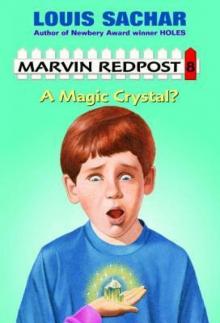 A Magic Crystal?
A Magic Crystal?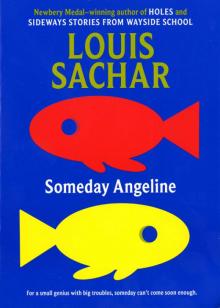 Someday Angeline
Someday Angeline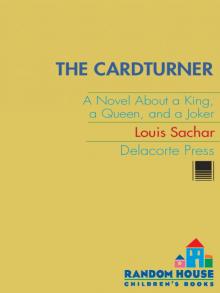 The Cardturner: A Novel About Imperfect Partners and Infinite Possibilities
The Cardturner: A Novel About Imperfect Partners and Infinite Possibilities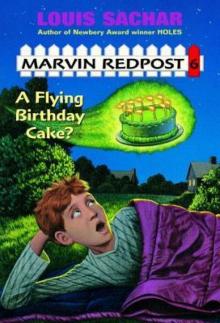 A Flying Birthday Cake?
A Flying Birthday Cake?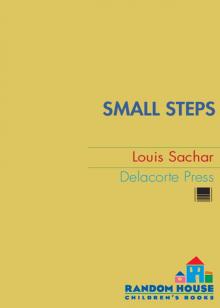 Small Steps
Small Steps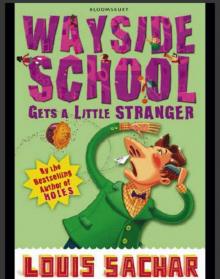 Wayside School Gets a Little Stranger
Wayside School Gets a Little Stranger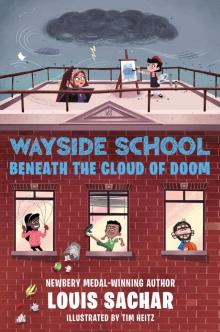 Wayside School Beneath the Cloud of Doom
Wayside School Beneath the Cloud of Doom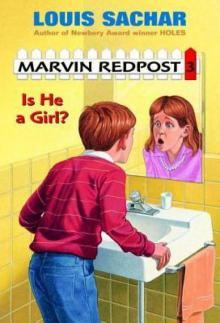 Is He a Girl?
Is He a Girl? Dogs Don't Tell Jokes
Dogs Don't Tell Jokes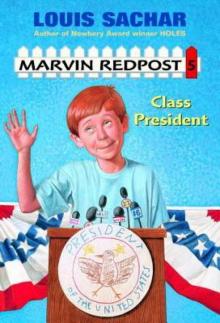 Class President
Class President Kidnapped at Birth
Kidnapped at Birth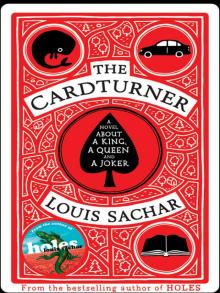 The Cardturner
The Cardturner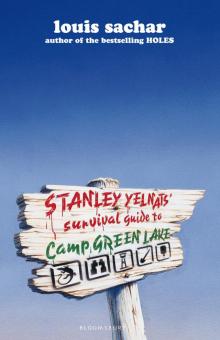 Stanley Yelnats' Survival Guide to Camp Greenlake
Stanley Yelnats' Survival Guide to Camp Greenlake